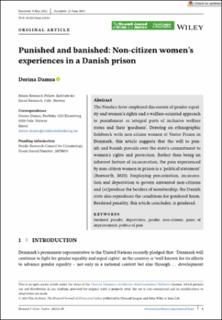| dc.contributor.author | Damsa, Dorina | |
| dc.date.accessioned | 2024-01-31T08:38:58Z | |
| dc.date.available | 2024-01-31T08:38:58Z | |
| dc.date.created | 2023-10-02T13:04:54Z | |
| dc.date.issued | 2023 | |
| dc.identifier.issn | 2059-1098 | |
| dc.identifier.uri | https://hdl.handle.net/11250/3114746 | |
| dc.description.abstract | The Nordics have employed discourses of gender equality and women's rights and a welfare-oriented approach to punishment as integral parts of inclusive welfare states and their ‘goodness’. Drawing on ethnographic fieldwork with non-citizen women at Vestre Prison in Denmark, this article suggests that the will to punish and banish prevails over the state's commitment to women's rights and protection. Rather than being an inherent feature of incarceration, the pain experienced by non-citizen women in prison is a ‘political statement’ (Bosworth, 2023). Employing precarisation, incarceration and deportation to govern unwanted non-citizens and (re)produce the borders of membership, the Danish state also reproduces the conditions for gendered harm. Bordered penality, this article concludes, is gendered. | |
| dc.description.abstract | Punished and banished: Non-citizen women's experiences in a Danish prison | |
| dc.language.iso | eng | |
| dc.title | Punished and banished: Non-citizen women's experiences in a Danish prison | |
| dc.title.alternative | Punished and banished: Non-citizen women's experiences in a Danish prison | |
| dc.type | Peer reviewed | |
| dc.type | Journal article | |
| dc.description.version | publishedVersion | |
| dc.source.journal | The Howard Journal of Crime and Justice | |
| dc.identifier.doi | 10.1111/hojo.12544 | |
| dc.identifier.cristin | 2180936 | |
| cristin.ispublished | true | |
| cristin.fulltext | original | |
| cristin.qualitycode | 1 | |
